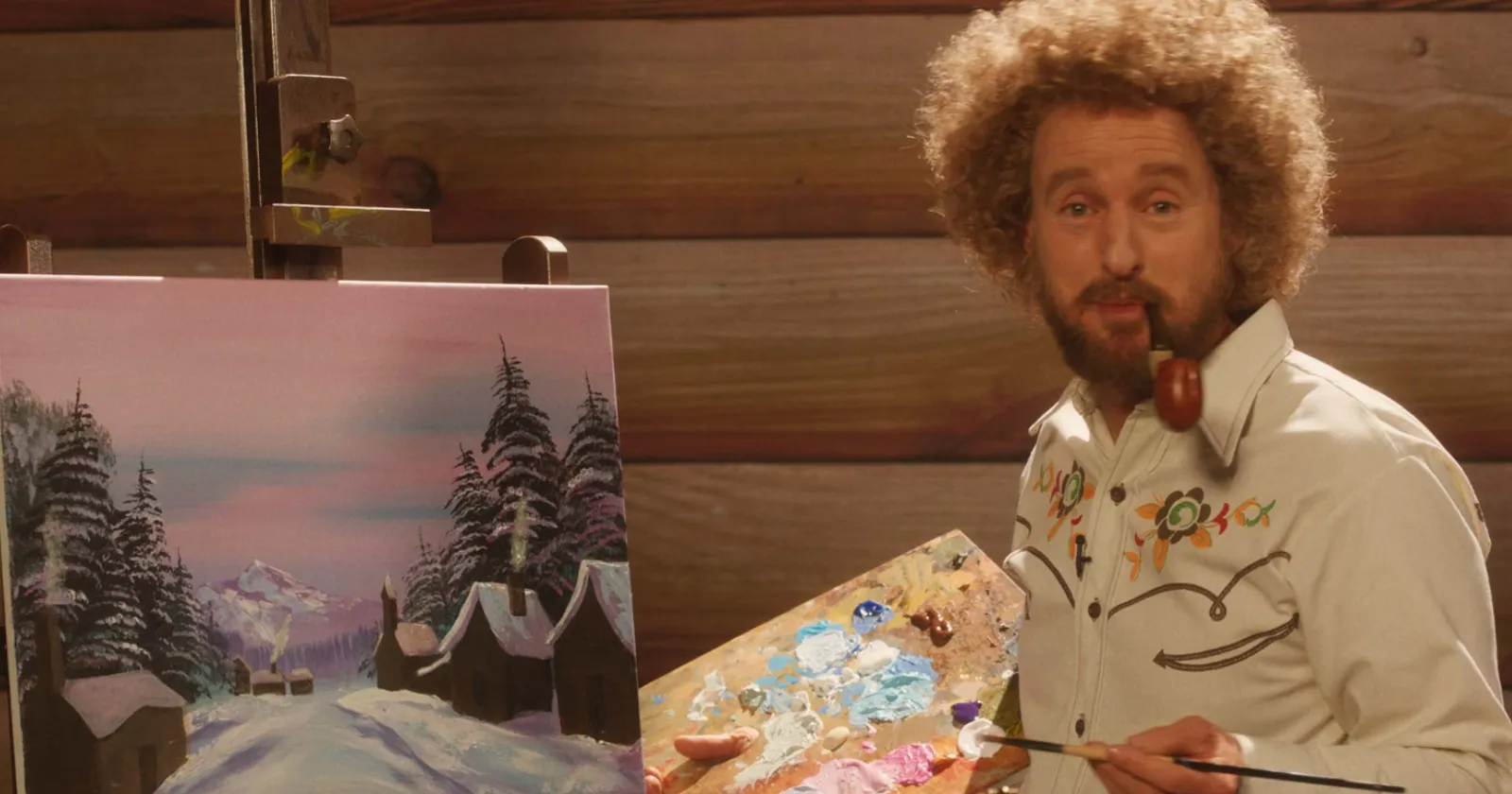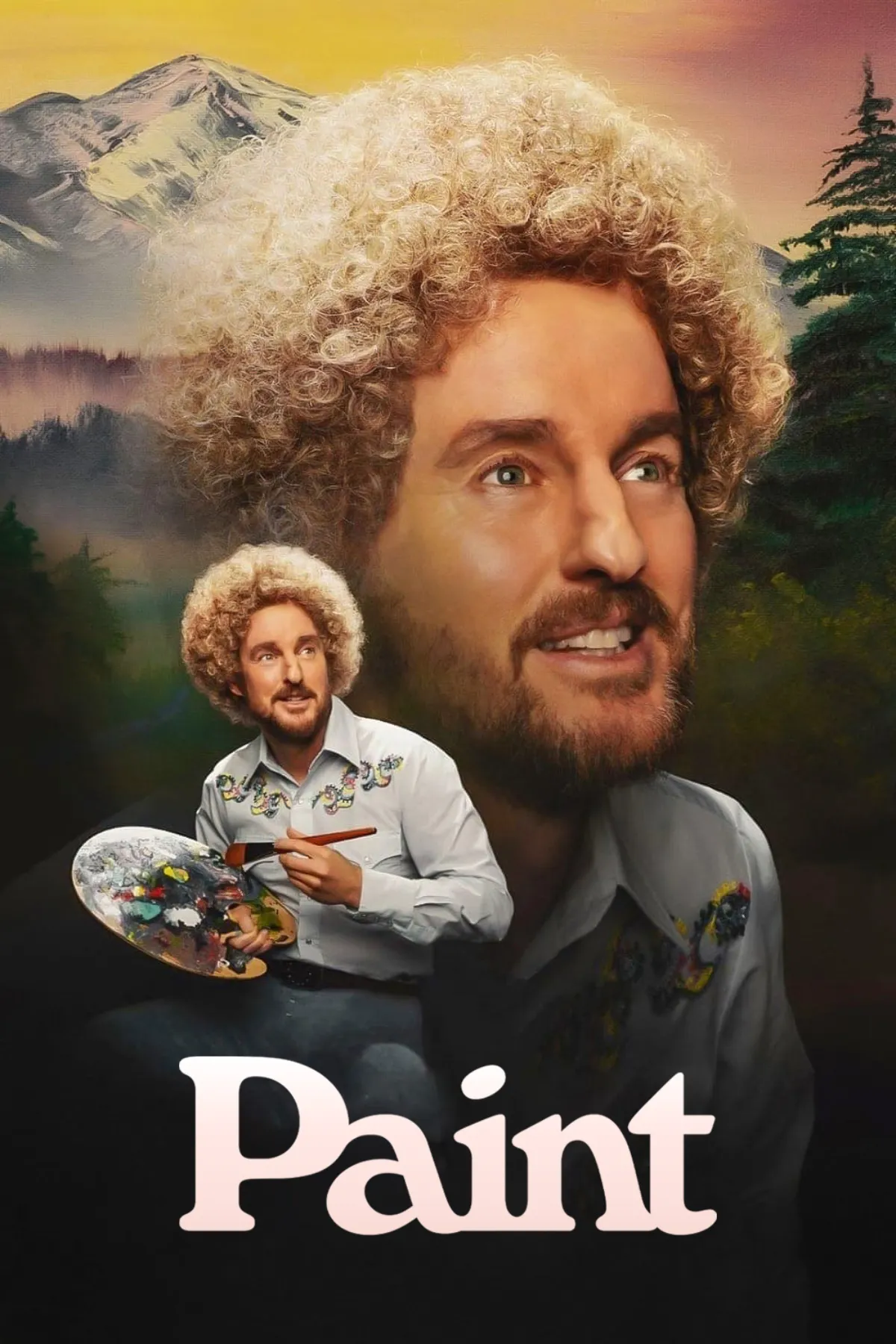The odd execution of Brit McAdams’ debut feature Paint grows stale fast. Although seeing Owen Wilson meander through the airy world as Bob Ross is occasionally played for funny jokes, stretching the premise to 90 minutes proves to be a tough and unsuccessful task.

‘Paint’ Movie Review
Paint is the newest movie from debut director Brit McAdams and lead actor Owen Wilson. Wilson needs little introduction at this point as he’s had a pretty significant track record up to the release if this new film. His work as an active collaborator with Wes Anderson on numerous movies, including writing credits in the earlier portion of Anderson’s career, combined with roles in studio comedies and Pixar animated films has landed him in rarified air in terms of contemporary leading actors, especially in the arthouse corner of the industry.
And naturally, given my love for these beforementioned Wes Anderson classics such as The Royal Tenenbaums and The Life Aquatic with Steve Zissou, as well as the guilty pleasure dopamine highs that I get from the Cars movies (yes, even Cars 2), I try to check out new Owen Wilson movies when I get the chance – even if they’re being negatively maligned during their press runs, or if they have a concept has half baked as “well, let’s just dress Owen up as Bob Ross and see what happens.” So, I suppose I was obligated to check out Paint the moment the movie got announced.
It helps that the movie was at least partially produced by IFC Films, who have played a role in helping burgeoning directors in the past. They’ve rarely landed the great film, but they frequently debut projects where you can clearly see a new creative mind working out the kinks in their styles. At best, you get movies like Mira Nair’s Monsoon Wedding, or more recent works like David Robert Mitchell’s The Myth of the American Sleepover. It’s films like these (especially the latter, which is quite flawed at various points) that I can find hope and a few visual motifs that stand out, even if they appear in a film not fully conveying what the writer and director hopes.
And I think that can apply to a movie like Paint as well. Brit McAdams is attempting to do a lot with his first movie: recreate enough of Bob Ross without complete parody, match that character to an idyllic world that operates within its own rules, and craft a compelling narrative worthy of a 90 minute movie. That’s pretty tough to do while also working out how your own visual and storytelling styles feel unique and original.
So while I can see plenty of criticisms from fellow writers blasting this movie for feeling lighter than its trying to dig into under the surface, I found McAdams’ attempt here to still be ambitious and rather singular – even if it doesn’t play out in a wholly successful manner.
Paint follows Owen Wilson’s Carl Nargle, a Bob Ross stand-in so blatantly obvious it’s a bit jolting when they reveal his fictitious name. Nargle’s painting show is televised every day on PBS, but a ratings slip is leading to monumental changes behind the scenes. When the network brings in a new artist in Ambrosia (Ciara Renee) to combat perceived notions of Nargle’s stale show, it sends the artist in a downhill spiral as he contemplates his own self-worth and career choices, as well as the women in his life that he’s wronged in the past.
I feel like it’s important to bring up Owen Wilson’s past career turns because Paint feels like such a mixture of the various pastiches that he’s worked in throughout his time in front of the camera. It’s incredibly vibrant and pulsating with color, but the tone to the film is much more mellow and spacy than the source material would suggest – as if the psychedelic imagery sprinkled throughout was passed on from a drugged-out crew that was putting the movie together.
There are a few supporting performances in Paint that are at least worth a shoutout, from Ciara Renee’s portrayal of the up-and-coming Ambrosia, who’s art style lends some of my favorite jokes of the movie – seriously, when her first painting turns from a log stump to a UFO shooting a beam of blood down to Earth, I thought the movie could only go down from there.
READ MORE MOVIE REVIEWS: Reality, Master Gardener, The Old Way
And surely enough, it mostly did. I admire Owen Wilson committing to the bit with Paint because the movie works so much better as a goofy, tongue-in-cheek ode to the real life world inspiring it. But beyond the cosplaying and mundane sets, there’s not much of a story to write home about. The movie bounces from past mistake to past mistake as Carl Nargle’s womanizing comments and actions boil to the forefront of the narrative.
I found at times the movie was hard to follow, and at others that I didn’t care much to follow at all. Michaela Watkins’ supporting performance as Nargle’s ex-girlfriend Katherine carries the weight of so much characterization for others that she rarely gets to bask in her own character at all. Stephen Root plays the PBS executive in charge of turning around the network’s struggling ratings, but he’s had similar performances in much better movies – he’s not really turning the needle in this one at all.
And essentially, there’s not much else to Paint. It got buried pretty quickly during its limited run in theaters, and it’s had short legs on VOD services too. It doesn’t get me too worked up to see director Brit McAdams’ next few features, but it does have me morbidly curious if he’ll at least hold onto a few of the visual motifs that I thought held this movie together ever so slightly.
Rating: 4/10
Paint (2023) is available to rent and buy on VOD
Paint Movie Cast and Credits

Paint Cast
Owen Wilson as Carl Nargle
Michaela Watkins as Katherine
Wendi McLendon-Covey as Wendy
Ciara Renée as Amrboisa
Lusia Strus as Beverly
Stephen Root as Tony
Paint Crew
Director: Brit McAdams
Writer: Brit McAdams
Cinematography: Patrick Cady
Editor: Sofi Marshall
Composer: Lyle Workman
1 thought on “Paint Review: Owen Wilson’s Cooky Bob Ross-Inspired Film Wears Its Influences on Its Sleeves”
Comments are closed.